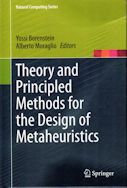In this book the editors establish a bridge between theory and practice, presenting principled methods that incorporate problem knowledge in evolutionary algorithms and other metaheuristics. The book consists of 11 chapters dealing with the following topics: theoretical results that show what is not possible, an assessment of unsuccessful lines of empirical research; methods for rigorously defining the appropriate scope of problems while acknowledging the compromise between the class of problems to which a search algorithm is applied and its overall expected performance; the top-down principled design of search algorithms, in particular showing that it is possible to design algorithms that are provably good for some rigorously defined classes; and, finally, principled practice, that is reasoned and systematic approaches to setting up experiments, metaheuristic adaptation to specific problems, and setting parameters. With contributions by some of the leading researchers in this domain, this book will be of significant value to scientists, practitioners, and graduate students in the areas of evolutionary computing, metaheuristics, and computational intelligence.
